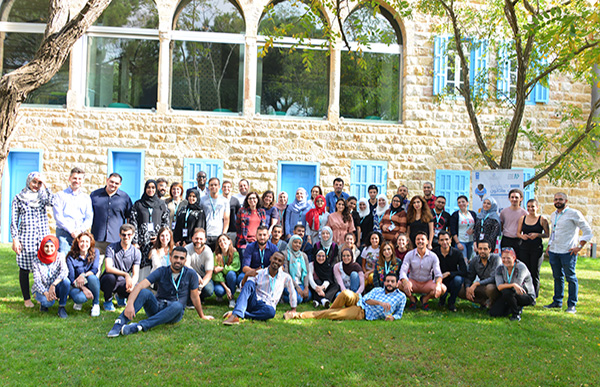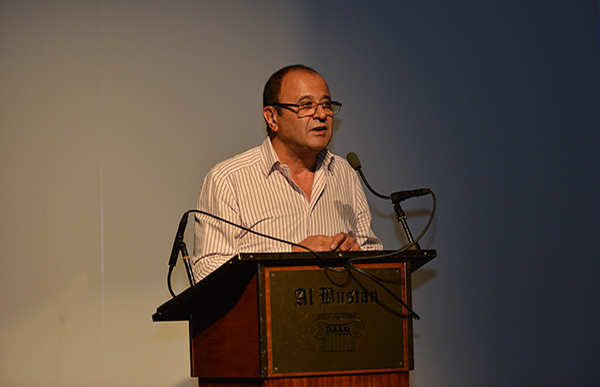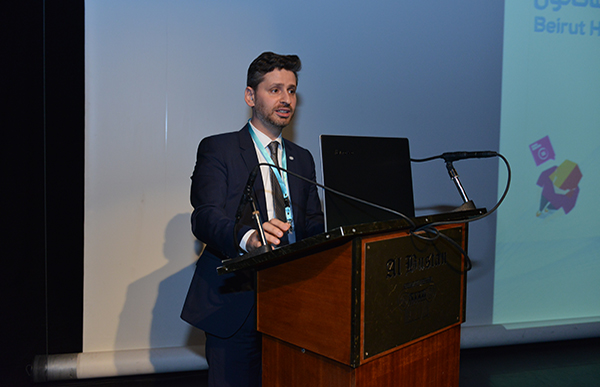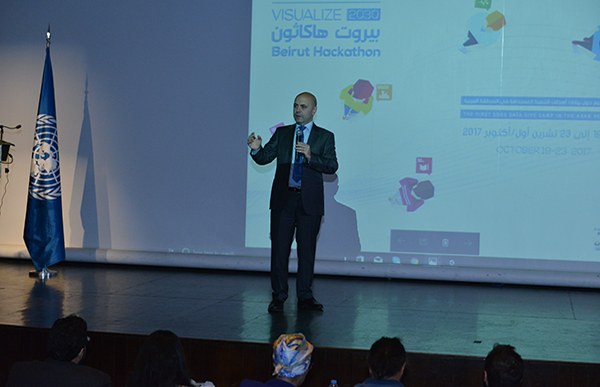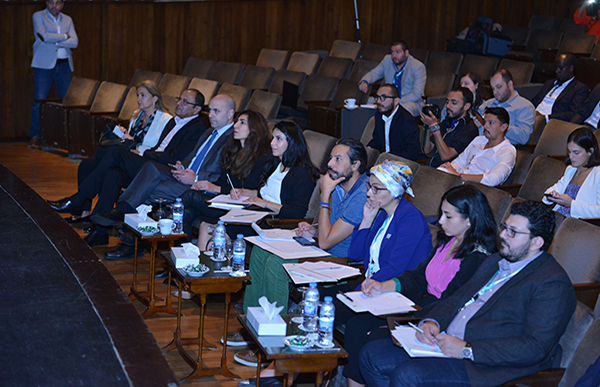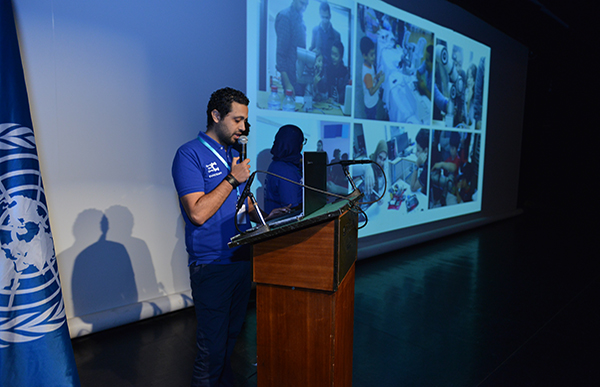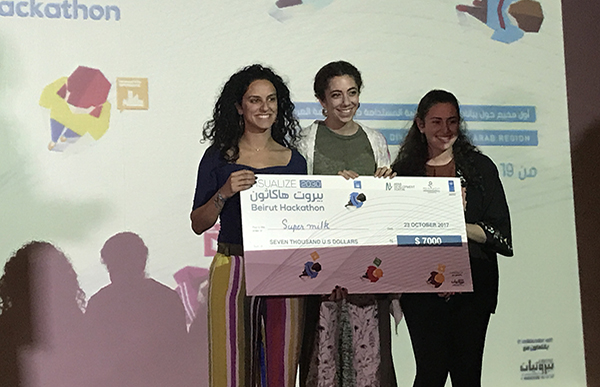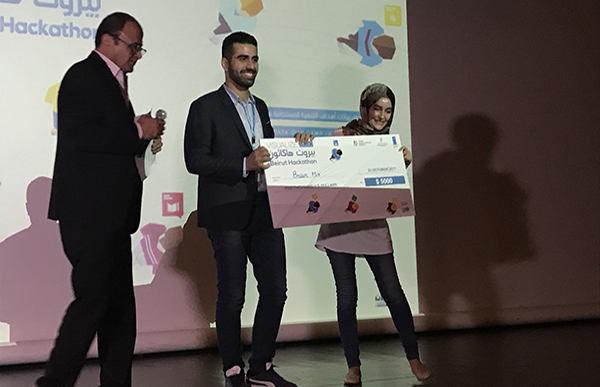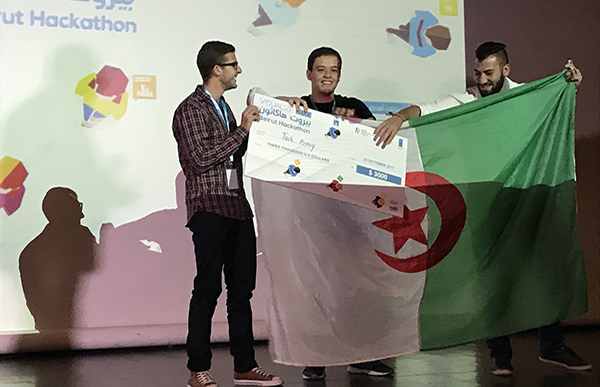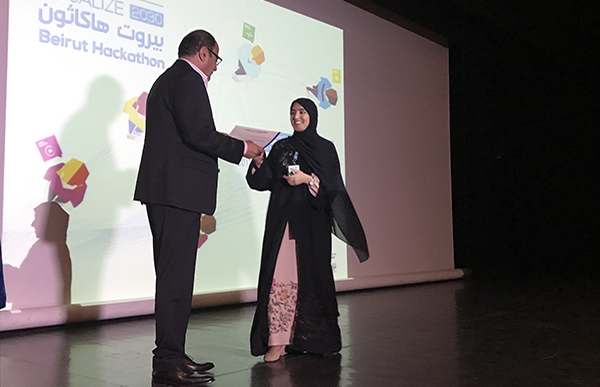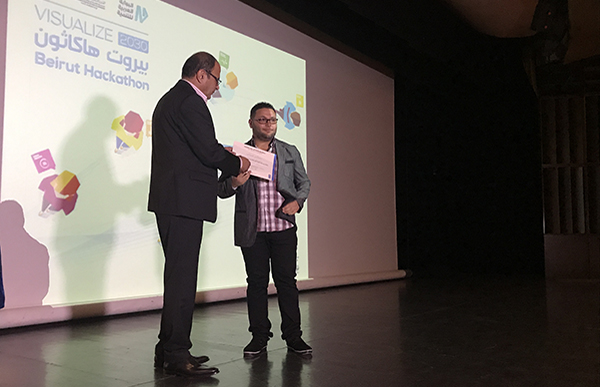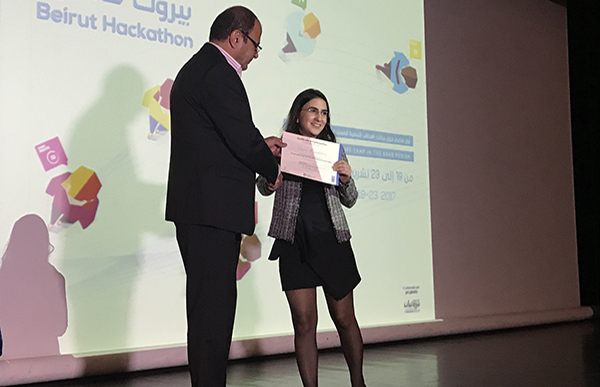Visualize 2030 – Beirut Hackathon 2017: Fifty youth share their visions of their countries by 2030
The Arab Development Portal (ADP) at the United Nations Development Programme (UNDP), organized the first Sustainable Development Goals (SDGs) Data Dive Camp in the Arab Region at Al Bustan Hotel, Beit Mery, bringing together 25 young women and 25 young men from 14 Arab countries to produce audio-visual products inspired from the 2030 Agenda for Sustainable Development.
Over five days, the teams were granted access to an on-site training and production facility where ten trainers on web development, coding, graphic design, animation, statistical analysis and visualization assisted the participants in producing their final products. The participants were selected from an initial group of 240 applicants including 600 youth, who applied through an open call.
The Closing Ceremony took place on Monday, October 23rd, with the presence of Deputy Prime Minister and the Minister of Health in Lebanon, Ghassan Hasbani and representatives of various organizations and media outlets.
Encouraging the consumption of data in support of advocacy campaigns
The main objective of Visualize 2030 is to encourage the consumption of data in support of advocacy campaigns and innovative thinking around development priorities and to contribute to enhancing an informed public debate in the region. Given that youth make up a third of the population in the region, working with youth is an important channel to ensure wide engagement. This will eventually encourage critical thinking and public awareness.
Minister Hasbani attended the participants’ presentations and addressed them saying “sustainable development is an important issue, but it has been well explored in the 2030 Agenda for Sustainable Development.” The 17 goals clearly demonstrate our need to build a different world. He congratulated the participants stating “there is depth to what you are doing. You have showed dedication and commitment by tackling one single priority. This is the best way to achieve theses ambitious goals.”
Simple arithmetic indicates that it is the youth who will eventually become the decision-makers in 2030
Khaled Abd El Shafi, Director of the Regional Hub in Amman, Regional Bureau for Arab States, UNDP, emphasized the role UNDP plays in ensuring a participatory process in implementing the 2030 Agenda despite the opposition this agenda faces. “Youth make up more than third of the population in the Arab region and the majority of the region's population is under the age of 30. Simple arithmetic indicates that it is the youth who will eventually become the decision-makers in 2030, and they have to assume the responsibility of ensuring that the process remains to their advantage and that of society at large.”
On the importance of data, Jafar al-Mahdi from the OPEC Fund for International Development and representing the Coordination Group of Arab, National and Regional Development Institutions (CG) said “the Arab World needs reliable sources of data and people who see patterns in them to allow decision-makers make informed decisions for a better future. The Arab Development Portal is here to give data producers, miners and consumers a platform to share and analyze this information.”
Youth were asked to visualize the trajectory of different issues concerning their countries by 2030
Farah Choucair, the Project Manager of ADP, said that “this is the first regional camp that brings together youth from diverse backgrounds to produce audio-visual products driven by facts and data on development issues such as poverty, unemployment, education, health, gender equality, peace, diverse societies, food security and sustainable development. The Camp aims to establish an innovative space to stimulate an informed and responsible public debate around countries’ and the region’s priorities. Youth were asked to visualize the trajectory of different issues concerning their countries by 2030 with the aim to encourage them to express their concerns especially those related to conflict, violence and societal polarization.
The participants formed 21 groups addressing: food security and health and the right to breastfeed (Lebanon), sustainable cities and societies and the right to education (Syria), the right to education and marine life (Tunisia), economic development (Algeria), peace and justice (Somalia), female genital mutilation (Palestine), justice in the labor market and sustainable cities (Egypt), water security (Oman), public transport (Iraq- Kurdistan), health (Yemen), pollution (Sudan) and violence (Jordan).
On the ceremony day, the participants presented their content in front of an evaluation committee of 6 members; namely, Alya Al-Ali, co-founder of Bayanat Box (Bahrain), Amr Al Iraqi, data journalist (Egypt), Fadi Bizri, co-founder of SE Factory (Lebanon), Huda Kaskas, president of Beirutiyat NGO (Lebanon), Jazem Halioui, director of Web Radar (Tunisia), and Nada Jaffal, design manager at the International Rescue Committee (Jordan).
The ADP is a joint initiative between the United Nations Development Programme (UNDP), the Coordination Group of Arab, National and Regional Development Institutions (CG), the Islamic Development Bank, and the OPEC Fund for International Development (OFID). The initiative aims to promote knowledge on development across the Arab region.
For more information on the event, follow #Visualize2030.
Individuals’ and Teams’ Productions
- Evocraft team (Tunisia) produced a short video on education in Tunisia. SDG4: quality education
- GEET team (Egypt) developed a website tackling gender equality and women participation in labor market focusing on Egypt. SDG5: gender equality
- Mohammed Abdel Moneim (Sudan) developed a system that measures the pollution level, with a website to record the data. SDG13: climate action
- Myth Terminator team (Lebanon) developed a game on poverty, focusing on social protection. SDG1: no poverty
- Nour team (Jordan) produced a short video on violence and radicalization. SDG16: peace, justice and strong institutions
- Blue, Yellow and Red team (Syria) developed a game visualizing a sustainable city. SDG11: sustainable cities and communities
- Mohammed Hassan Mohamed (Somalia) produced a short video on election and voting system in Somalia. SDG16: peace, justice and strong institutions
- Tech Army team (Algeria) developed a website on industrial investment in Algeria. SDG8: decent work and economic growth | SDG9: industry, innovation and infrastructure
- Dream team (Yemen) produced a short video on raising awareness on cholera in Yemen. SDG3: good health and well-being
- Nedaa Hany Mahboub (Egypt) visualizing a ‘happy Egypt by 2030’. SDG11: sustainable cities and communities
- Pinna team (Tunisia) produced a short video on preserving life below water. SD14: life below water
- Brain Mix team (Iraq) developed a website on enhancing education in Iraq. SDG4: quality education
- Rana Fahmy Abdellatif (Egypt) produced a short video on water scarcity in the Arab region. SDG6: clean water and sanitation
- Supermilk team (Lebanon) produced a video on the importance of breastfeeding. SDG3: good health and well-being
- Sada el shabab team (Sultanate Oman) produced a video to raise awareness on water scarcity in the gulf region focusing on Sultanate Oman. SDG6: clean water and sanitation
- Hammam Ahmed Hammam (Egypt) developed a website on plastics and SDGs. SDG17: partnerships for the goals
- Vision team (Syria) developed a website and application on education. SDG4: quality education
- Thoughtful Nutrition (Lebanon | Bahrain) produced infographics on nutrition and overweight. SDG3: good health and well-being
- Change-makers (Syria) developed a website on the future state of the Syrian economy. SDG8: decent work and economic growth
- Enlightens team (Iraq) developed an application on the public transportation system in Iraq. SDG11: sustainable cities and communities
- Rand Jarallah (Palestine) produced a video on female genital mutilation. SDG5: gender equality
